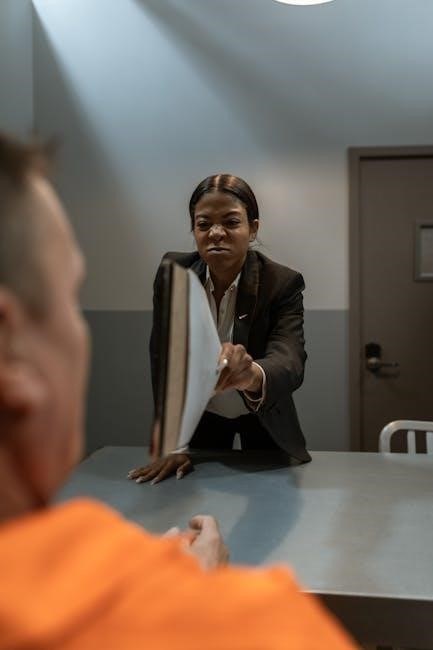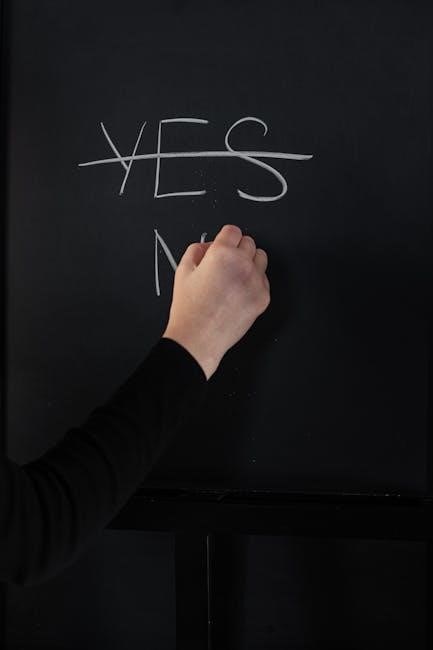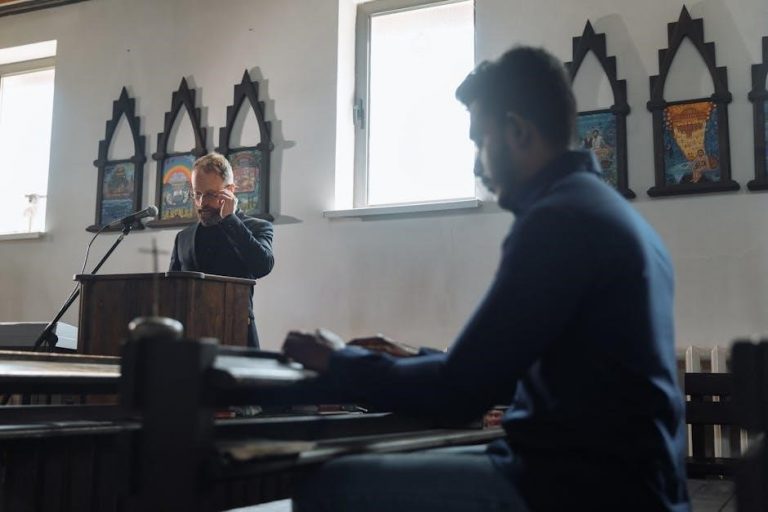Mock trial criminal cases simulate real legal proceedings, enabling participants to explore roles, evidence, and courtroom etiquette while enhancing critical thinking and public speaking skills effectively.
1.1. Definition and Purpose of Mock Trials
A mock trial is a simulated court proceeding where participants act out roles such as prosecutors, defense attorneys, judges, witnesses, and jurors. Its primary purpose is to educate students about legal procedures, courtroom etiquette, and the adversarial system. By engaging in mock trials, participants gain hands-on experience in critical thinking, public speaking, and teamwork. These exercises are particularly valuable in legal education, as they bridge theoretical knowledge with practical application, fostering a deeper understanding of criminal and civil law principles and processes effectively.
1.2. Importance of Mock Trials in Legal Education
Mock trials play a pivotal role in legal education by providing students with practical exposure to courtroom dynamics. They enhance understanding of legal concepts, evidence presentation, and trial procedures. Through active participation, students develop critical thinking, research, and public speaking skills. Mock trials also foster teamwork and analytical reasoning, essential for future legal professionals. Additionally, they promote engagement with real-world legal issues, making complex theories more accessible and applicable, thereby enriching the overall learning experience in criminal and civil law contexts effectively and comprehensively.
1.3. Overview of Criminal Cases in Mock Trials
Mock trials involving criminal cases simulate real legal proceedings, focusing on hypothetical or simplified scenarios. These cases typically include witness testimonies, evidence presentation, and jury deliberation. Participants assume roles such as prosecutors, defense attorneys, judges, and jurors, engaging in adversarial arguments and cross-examinations. The structure often mirrors actual court processes, with case materials providing background, legal standards, and procedural guidelines. This hands-on approach helps participants understand criminal law principles, courtroom etiquette, and the adversarial system while developing practical legal skills in a controlled educational environment effectively and comprehensively.
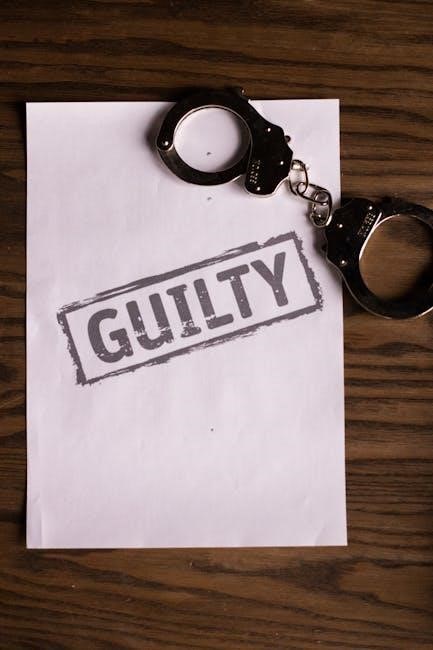
Roles and Responsibilities in a Mock Trial
Mock trials involve key roles such as prosecutors, defense attorneys, judges, witnesses, and jurors, each with distinct responsibilities that simulate real courtroom dynamics and legal procedures effectively.
2.1. Prosecutor: Role and Duties
The prosecutor represents the state, presenting criminal charges against the defendant. Their duties include delivering opening statements, examining witnesses, and presenting evidence to prove guilt beyond a reasonable doubt. They must adhere to ethical standards, ensuring justice is served while opposing the defense’s arguments. The prosecutor’s role is crucial in upholding the legal system’s integrity and seeking fair outcomes in criminal cases through rigorous preparation and courtroom advocacy.
2.2. Defense Attorney: Role and Duties
The defense attorney represents the defendant, ensuring their rights are protected throughout the trial. Their primary duties include cross-examining prosecution witnesses, challenging evidence, and presenting a defense case. They deliver opening and closing statements, aiming to create reasonable doubt about the defendant’s guilt. The defense attorney must adhere to ethical standards, advocating zealously while maintaining professionalism. Their role is pivotal in ensuring a fair trial, safeguarding the defendant’s interests, and upholding justice within the legal framework of the mock trial proceedings.
2.3. Judge: Role and Responsibilities
The judge oversees the mock trial, ensuring adherence to procedural rules and maintaining order. They rule on the admissibility of evidence, manage witness examinations, and guide jury deliberations. The judge remains impartial, facilitating a fair trial by addressing legal issues and clarifying points of law. Their responsibilities include declaring recesses, instructing the jury, and pronouncing the verdict. The judge’s role is crucial in simulating real courtroom dynamics, providing students with practical insights into judicial processes and the administration of justice within the mock trial setting.
2.4. Witnesses: Their Role in the Trial
Witnesses provide factual testimony based on their knowledge or observations. They are called by either the prosecution or defense to support the case. During direct examination, they answer questions from their summoning attorney, while cross-examination allows the opposing side to challenge their testimony. Witnesses must be truthful and clear, adhering to the judge’s instructions. Their role is essential in presenting evidence, helping the jury understand the facts, and contributing to the fair resolution of the case within the mock trial framework.
2.5. Jury: Responsibilities and Decision-Making
The jury’s primary responsibility is to listen impartially to the evidence presented and deliberate to reach a fair verdict. They must remain unbiased and follow the judge’s instructions. After hearing both sides, the jury discusses the case privately, weighing the credibility of witnesses and the strength of evidence. Their decision determines the outcome, reflecting their understanding of the law and the facts presented. The jury’s role is crucial in ensuring justice and upholding the legal process within the mock trial framework.
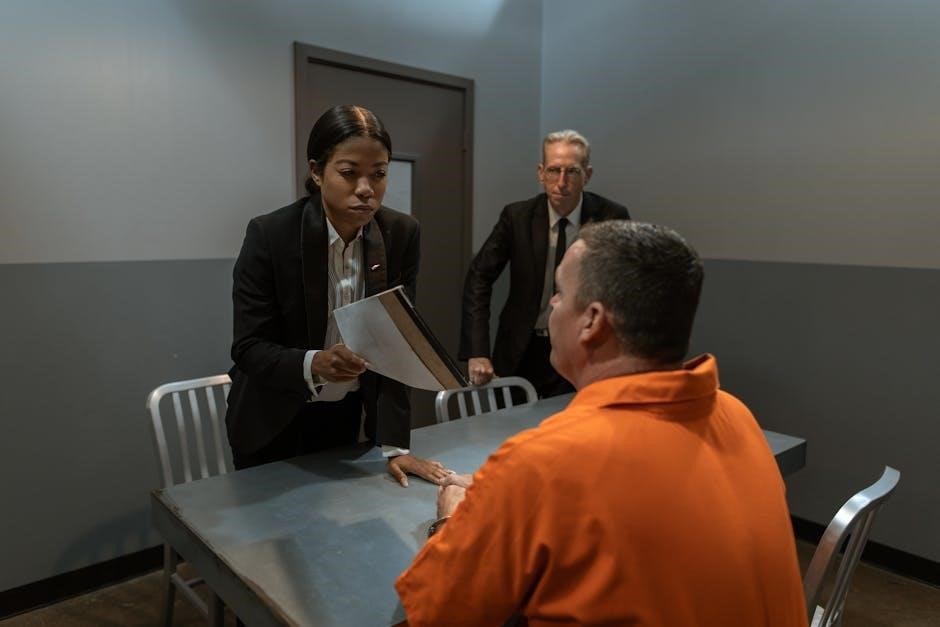
Preparing for a Mock Trial
Preparing involves analyzing case materials, drafting statements, and organizing evidence to effectively present arguments during the trial, ensuring a comprehensive understanding of legal procedures and roles.
3.1. Selecting a Criminal Case for the Mock Trial
Selecting a criminal case involves evaluating its complexity, educational value, and relevance to legal principles. Cases should be clear, engaging, and appropriate for participants’ skill levels, ensuring they align with learning objectives and provide practical insights into the criminal justice system. The chosen case should include detailed facts, evidence, and legal issues, allowing for comprehensive analysis and effective role-playing during the trial. This step is crucial for an authentic and meaningful mock trial experience.
3.2. Understanding the Case Materials and Evidence
Understanding the case materials and evidence is essential for preparing a mock trial. Participants must thoroughly review the facts, witness statements, and legal documents provided. This includes analyzing the credibility of evidence, identifying key legal issues, and ensuring compliance with procedural rules. The materials often include witness affidavits, police reports, and expert testimonies. Teams must assess the admissibility and reliability of evidence to build strong arguments. This step ensures participants grasp the factual and legal foundation of the case, enabling effective trial preparation and presentation.
3.3. Drafting Opening and Closing Statements
Drafting compelling opening and closing statements is critical in a mock trial. The opening statement outlines the case, key evidence, and legal strategy, setting the tone for the trial. It should succinctly present the facts and engage the jury. Closing statements summarize the case, reinforcing arguments and evidence, while addressing weaknesses in the opponent’s case. Both statements must be clear, concise, and persuasive, aligning with legal standards. Teams should practice delivering these statements to ensure effective communication and maximum impact in the courtroom.
3.4. Preparing Witness Examinations and Cross-Examinations
Preparing witness examinations and cross-examinations is vital for a successful mock trial. Witnesses provide crucial testimony that supports or challenges the case. Direct examinations by the prosecution or defense aim to elicit factual, relevant information. Cross-examinations test credibility and challenge opposing evidence. Teams must craft clear, focused questions and anticipate responses. Witnesses should practice delivering testimony confidently and consistently. Effective preparation ensures that both sides present their cases cohesively, adhering to legal standards and fostering a realistic trial experience.
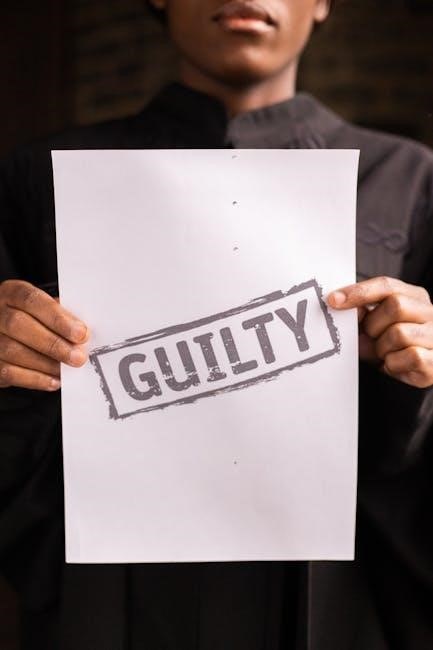
The Mock Trial Process
A mock trial mimics real courtroom proceedings, involving opening statements, evidence presentation, witness examinations, and closing arguments. The jury then deliberates to reach a verdict based on the evidence presented.
4.1. Courtroom Etiquette and Procedures
Courtroom etiquette involves respect for the judge, proper addressing of legal professionals, and appropriate attire. Procedures include swearing in witnesses, presenting evidence, and following rules of evidence. The court clerk manages administrative tasks, while the bailiff ensures order. Participants must maintain decorum, avoiding disruptions. Understanding these protocols is crucial for a realistic and professional mock trial experience, reflecting the formal nature of actual criminal proceedings. These practices help students grasp the structure and expectations of legal proceedings. Proper adherence enhances the educational value of the mock trial.
4.2. Presenting the Case: Prosecution and Defense
The prosecution presents its case first, outlining charges and evidence to prove guilt. They call witnesses and present exhibits to build a compelling narrative. The defense then counters, challenging evidence and raising doubts. Both sides deliver opening and closing statements, framing their arguments. Witnesses are examined and cross-examined, with attorneys using persuasive techniques. The prosecution aims to meet the burden of proof, while the defense seeks reasonable doubt. This structured exchange mimics real trials, fostering critical thinking and legal acumen among participants.
4.3. Evidence Presentation and Admissibility
Evidence presentation in mock trials requires adherence to legal standards, ensuring relevance and reliability. Attorneys must properly introduce exhibits, with opposing counsel able to object. Judges rule on admissibility, teaching participants about evidence rules. This process mirrors real trials, emphasizing the importance of procedural accuracy. Students learn to distinguish between admissible and inadmissible evidence, enhancing their understanding of legal principles and courtroom dynamics. This hands-on experience fosters analytical skills and attention to detail, crucial for future legal professionals.
4.4. Jury Deliberation and Verdict
Following evidence presentation, the jury retires to deliberate, discussing the case’s merits. They weigh the prosecution’s and defense’s arguments, applying legal instructions. The verdict must be unanimous or meet specified majority rules. Post-deliberation, the jury foreperson announces the decision in court. This stage teaches participants the significance of impartial decision-making and the impact of evidence on outcomes. It also highlights the gravity of jury duty in upholding justice, mirroring real-world legal processes and fostering respect for the judicial system.
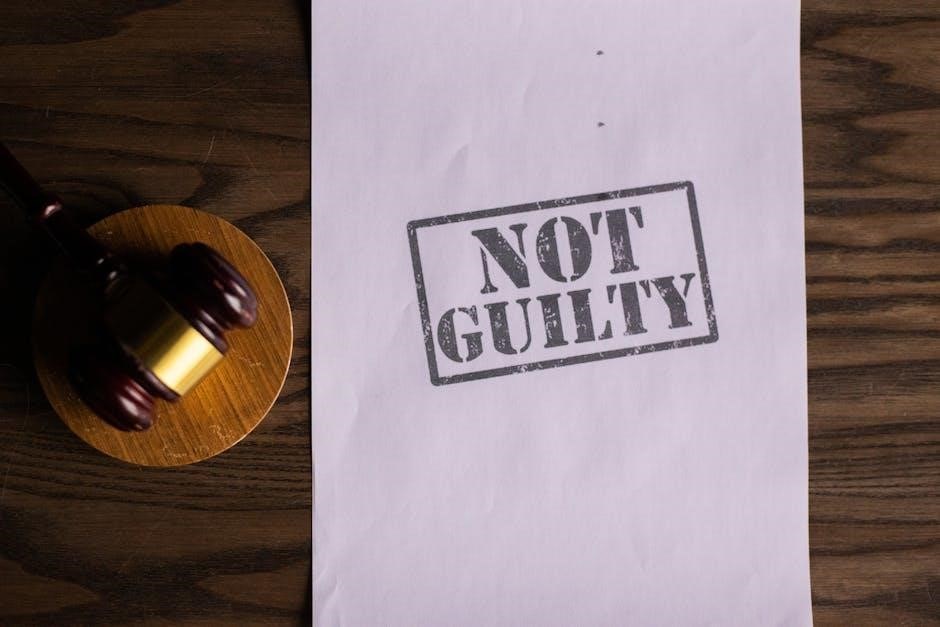
Educational Value of Mock Trials
Mock trials enhance understanding of the judicial system, fostering critical thinking, public speaking, and teamwork. They bridge legal theory with practical application, enriching students’ educational experiences profoundly.
5.1. Enhancing Legal Knowledge and Skills
Mock trials provide immersive learning experiences, allowing participants to analyze case materials, draft statements, and examine witnesses. These activities enhance legal knowledge by applying theoretical concepts to practical scenarios. Students gain insight into criminal procedures, evidence rules, and courtroom dynamics. Engaging in mock trials fosters a deeper understanding of legal terminology, case preparation, and argumentation techniques. Additionally, participants develop critical skills in public speaking, cross-examination, and strategic thinking, preparing them for real-world legal challenges and fostering a strong foundation in legal practice.
5.2. Developing Critical Thinking and Public Speaking
Mock trials serve as a dynamic platform for honing critical thinking and public speaking abilities. Participants must analyze evidence, anticipate arguments, and articulate their positions persuasively. This process enhances their ability to think on their feet and communicate effectively. Through drafting statements and conducting examinations, students refine their verbal and non-verbal communication skills. These experiences build confidence and foster clarity in expression, preparing them for challenges in legal and professional environments while strengthening their overall articulation and argumentation skills.
5.3. Understanding the Criminal Justice System
Mock trials offer hands-on experience, enabling participants to grasp the criminal justice system’s structure and functions. By simulating real cases, students learn about roles like judges, prosecutors, and defense attorneys, as well as courtroom procedures and evidence rules. This practical exposure fosters a deeper understanding of how trials operate, from presenting evidence to jury deliberations. Such experiences prepare students for real-world legal scenarios, bridging the gap between theoretical knowledge and practical application of criminal justice principles and courtroom procedures.
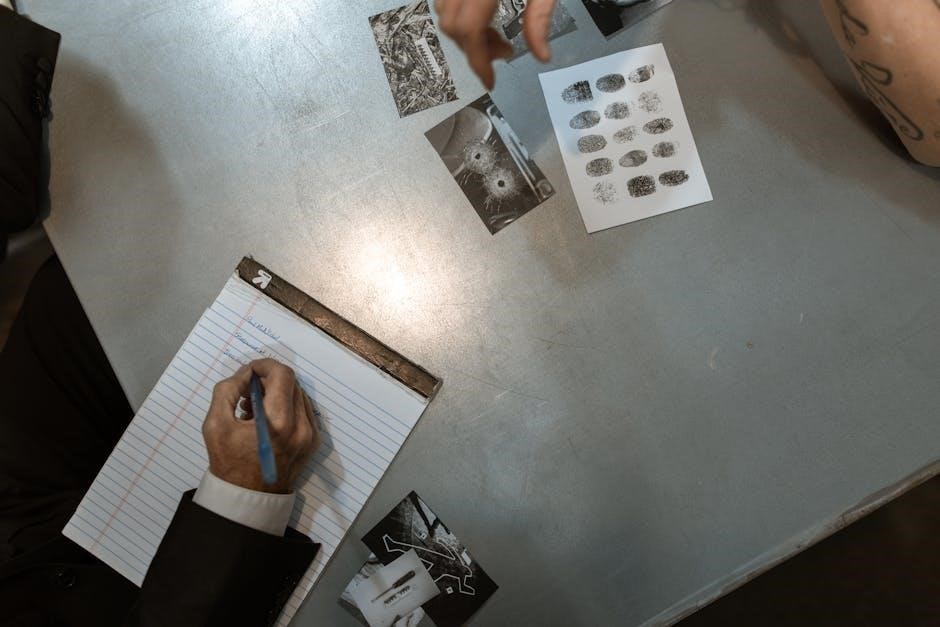
Advanced Topics in Mock Trial Criminal Cases
Advanced topics explore integrating case law and legal precedents into trials, enhancing realism and complexity. Technology tools, like virtual courtrooms, further simulate authentic legal proceedings for educational enrichment.
6.1. Incorporating Case Law and Legal Precedents
Incorporating case law and legal precedents into mock trials enhances the educational experience by simulating real-world legal strategies. Participants analyze landmark cases to strengthen arguments, ensuring decisions align with established legal standards. This approach fosters deeper understanding of how prior rulings shape current judicial outcomes.
By integrating case law, students learn to draft motions, challenge evidence, and reference relevant precedents during trials. This advanced technique prepares future legal professionals to apply theoretical knowledge in practical scenarios effectively.
6.2. Using Technology in Mock Trials
Technology enhances mock trials by providing virtual platforms for remote participation, digital evidence presentation, and AI tools for case analysis. Virtual simulations allow realistic courtroom experiences, while digital exhibits streamline evidence management. Recording trials enables post-session reviews and feedback. Online resources and case databases also support preparation, making mock trials more accessible and engaging for participants.
These tools foster collaboration, improve performance tracking, and prepare students for modern legal practices, ensuring a dynamic and immersive learning environment.
6.3. Real-World Applications of Mock Trial Skills
Skills gained from mock trials, such as critical thinking, public speaking, and evidence analysis, are invaluable in real-world legal careers. Attorneys use these skills to craft compelling arguments, question witnesses effectively, and present evidence persuasively. Additionally, understanding courtroom procedures and legal terminology prepares individuals for professional roles in criminal justice and law-related fields. These practical applications make mock trials a vital training ground for future legal professionals, enhancing their readiness to handle actual cases with confidence and expertise.
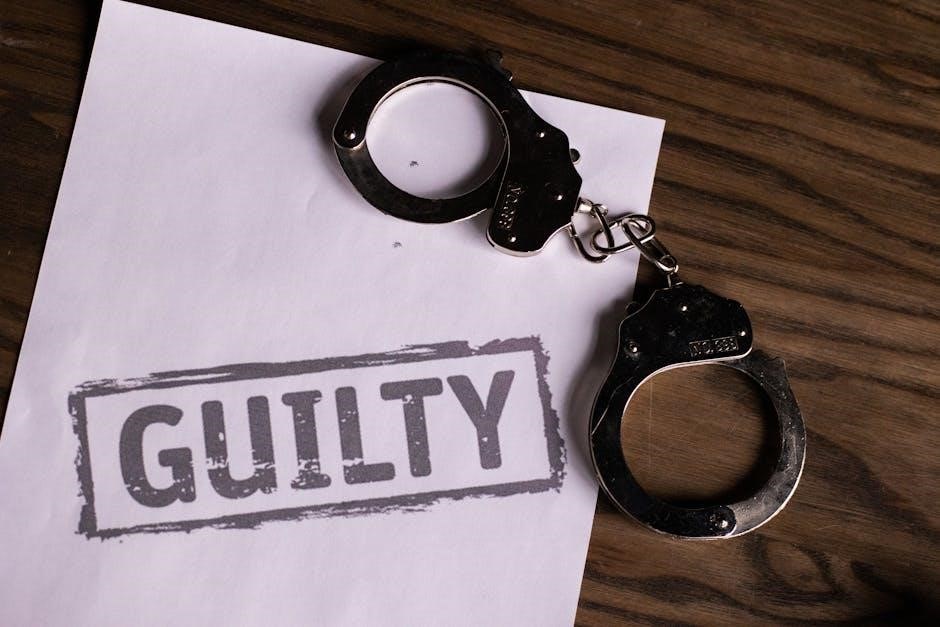
Resources for Mock Trial Criminal Cases
Mock trial criminal cases are supported by various resources, including case materials, witness statements, legal guides, and instructional manuals. These resources provide realistic scenarios, evidence guidelines, and procedural frameworks, enabling participants to prepare thoroughly for trials. Online platforms, educational programs, and legal organizations offer downloadable case packets and training tools to facilitate engaging and authentic mock trial experiences.
7.1. Finding Mock Trial Case Materials Online
Mock trial case materials are widely available online, offering realistic criminal scenarios, witness statements, and legal guidelines. Platforms like the Law-Related Education Program and mock trial associations provide downloadable case packets. These materials include hypothetical cases, evidence, and procedural instructions, ensuring authenticity. Educators and participants can access these resources to prepare for trials effectively. Additionally, many programs offer targeted case materials for criminal law, making it easier to focus on specific legal concepts and trial strategies. Online repositories are invaluable for organizing engaging mock trial experiences.
7.2. Best Practices for Organizing a Mock Trial
Organizing a mock trial requires clear role assignments, detailed case preparation, and a structured timeline. Ensure all participants understand their responsibilities, from prosecutors to jurors. Use authentic case materials and evidence to mimic real trials. Conduct rehearsals to refine arguments and witness testimonies. Create a realistic courtroom setup to enhance engagement. Provide feedback sessions post-trial to foster learning. Encourage active participation and critical thinking. By following these practices, mock trials become effective tools for legal education and skill development. Proper organization ensures a smooth, immersive experience for all involved.
7.3. Evaluating Mock Trial Performance
Evaluating mock trial performance involves assessing participants’ understanding of legal procedures and their ability to articulate arguments. Focus on critical thinking, public speaking, and teamwork. Provide constructive feedback on adherence to courtroom etiquette and evidence presentation. Use standardized criteria to ensure fairness and consistency. Peer and instructor feedback can enhance learning outcomes. Record trials for self-review, fostering personal growth. Regular evaluation helps refine skills and prepares participants for real-world legal scenarios. Continuous improvement is key to maximizing educational benefits of mock trials.
